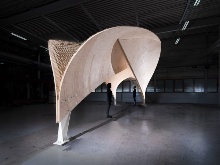Insitu self-shaping of a lightweight form active wood structure
At the nexus of complex ecological, socioeconomic, and sociocultural crises, the built environment urgently requires a fundamentally new approach to design, engineering, and construction. As we shift from an era of energy abundance and industrial materials to one of energy scarcity and natural materials, material intelligence will become synonymous with construction logic. HygroShell, which makes its debut at the Chicago Architecture Biennial 2023, is at the forefront of this paradigm shift, harnessing the previously undesirable hygroscopic material properties of wood to create form and structure, exploring a new kind of bio-based and bio-inspired architecture.
HygroShell investigates a first-of-its-kind, self-constructing-timber building system, heralding new material cultures in architecture. Utilizing novel computational methods to access timber’s inherent shape-changing properties, HygroShell showcases the design, engineering, and production of a full-scale, long-spanning, lightweight shell made from flat-packed, components curved in situ. Each component contains architectural, structural, and kinetic characteristics embedded into its flat state, actuating on site to produce a curved, shingle-clad, interlocked geometry.
The result is a delicately arced canopy spanning 10 meters while only 28 millimeters thin. Diverging from typical structural typologies, the roof’s single-curved design unlocks new potentials for resource-saving, thin-shell construction with bio-based materials. HygroShell explores an alternative approach to future-proof architecture using the fundamental properties of timber as an in-situ shaping mechanism, structural driver, and design foundation. Through this computationally enabled understanding of natural materials, it is possible to achieve deeper architectural integration in both material and form, and to explore an ecologically effective, yet expressive material culture in architecture.
HygroShell was developed as a research pavilion within the context the ITECH Master’s program and the Cluster of Excellence Integrative Computational Design and Construction for Architecture (IntCDC), highlighting the importance and potentials of a cross-disciplinary and diverse research and educational environment.


